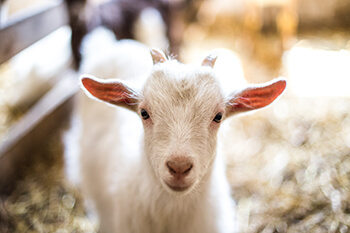Details on Deworming
Jul 29, 2019

Goat deworming is one of the animal heath world’s most highly debated and controversial topics for several different reasons.
First, there are very few dewormers on the market that are labeled for small ruminant use. Consequently, goat parasites have developed varying degrees of resistance due to inappropriate or over-usage of both labeled and off-label dewormer products. As a result, several parasites have developed resistance issues, leaving no reliable alternate method to eliminate them from the herd. In addition, the goat is not tolerant of overcrowding and poor animal management with respect to parasites, leading to confusion about how to handle these animals.
The need for effective deworming programs for goats led to a method of deworming known as FAMANCHA. This method is based on deworming the goat according to its individual needs, not on a calendar time frame.
In this method of deworming, each individual goat is examined and graded into a category of 1-5 by looking at the conjunctiva and sclera of the eye. Grade 1s have pink, healthy eye structures as compared to grade 5s, which are pale and anemic. This scale is a crude measurement of the degree of anemia caused by the parasite. This method recommends deworming goats that are in the grade 4 or 5 range and, in some circumstances, grade 3. Grades 1 and 2 are not dewormed at all. The main premise behind this process is to only deworm goats that really need it, which promotes natural resistance to the parasites and culling the goats that are repeatedly in the Grade 4 or 5 categories.
Another “rule” in this method is to use a dewormer that is effective and continue until it is ineffective. Your veterinarian can run a fecal egg count reduction test to identify if the current dewormer you use is effective.
If you have questions about FAMANCHA, see your local veterinarian or a certified FAMANCHA trainer. Your local Co-op can also help you with dewormer choices.
First, there are very few dewormers on the market that are labeled for small ruminant use. Consequently, goat parasites have developed varying degrees of resistance due to inappropriate or over-usage of both labeled and off-label dewormer products. As a result, several parasites have developed resistance issues, leaving no reliable alternate method to eliminate them from the herd. In addition, the goat is not tolerant of overcrowding and poor animal management with respect to parasites, leading to confusion about how to handle these animals.
The need for effective deworming programs for goats led to a method of deworming known as FAMANCHA. This method is based on deworming the goat according to its individual needs, not on a calendar time frame.
In this method of deworming, each individual goat is examined and graded into a category of 1-5 by looking at the conjunctiva and sclera of the eye. Grade 1s have pink, healthy eye structures as compared to grade 5s, which are pale and anemic. This scale is a crude measurement of the degree of anemia caused by the parasite. This method recommends deworming goats that are in the grade 4 or 5 range and, in some circumstances, grade 3. Grades 1 and 2 are not dewormed at all. The main premise behind this process is to only deworm goats that really need it, which promotes natural resistance to the parasites and culling the goats that are repeatedly in the Grade 4 or 5 categories.
Another “rule” in this method is to use a dewormer that is effective and continue until it is ineffective. Your veterinarian can run a fecal egg count reduction test to identify if the current dewormer you use is effective.
If you have questions about FAMANCHA, see your local veterinarian or a certified FAMANCHA trainer. Your local Co-op can also help you with dewormer choices.